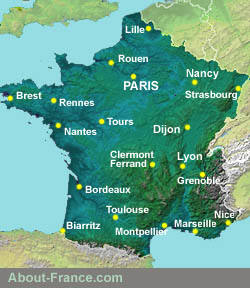
About-France.com
The connoisseur's
guide to France
French life, institutions, society, travel and tourism.

- Explore France ►
- KEY PAGES
- Where to go
- How to get there
- Learn about France
French
grammar
: demonstratives
Demonstrative adjectives and pronouns
1. Demonstrative adjectives
Like other adjectives, demonstrative adjectives in French agree in number and gender with the noun they qualify. The basic French demonstrative does not distinguish between the concepts of proximity and distance, so when used alone, ce and its inflected forms can mean either this or that.- In the masculine singular, ce is the normal form, cet is used before a (phonetic) vowel.
- In the feminine singular, the demonstrative adjective is cette.
- In the plural, the only form is ces.
Specifying proximity and distance
Demonstrative adjectives in French can be modified in order to indicate (relative) proximity and distance. Often this is not necessary, as context will be sufficient to clarify the meaning; but if needed, proximity is indicated by adding the particle -ci to the end of the noun, distance is indicated by adding the particle -là to the end of the noun.
Examples:
- This / that painting is very well known.
- That afternoon he had a headache
Cet après-midi-là il avait mal à la tête.
- This / that painting is very well known.
Ce tableau est très bien connu
.
- This painting is very well-known.
Ce tableau-ci est très bien connu
.
- That painting (over there) is considerably less well-known.
Ce tableau-là est nettement moins bien
connu .
- This / that boy and this/that girl know each other very
well.
Ce garçon et cette fille se connaissent
très bien .
- These / those young ladies are very impatient
Ces demoiselles sont très impatientes.
- I rather like these (those)
apples
J'aime assez bien ces pommes
- This man is my uncle. Cet homme
est mon oncle
- He's arriving this afternoon Il
arrive cet après-midi
(No
need to add -ci
to demonstrate that it is "this"
not "that"
afternoon: proximity is the default value. Compare with the following
example)- That afternoon he had a headache
Cet après-midi-là il avait mal à la tête.
2. Demonstrative pronouns
Demonstrative pronouns, like other pronouns, agree in gender and number with the noun they stand for.Demonstrative pronouns distinguish between proximity and distance.
The notions of proximity and distance can be spatial, temporal or even grammatical - closeness in time, closeness in distance, or even closeness within the sentence.
| Mas. sing. | Fem. sing. | Masc. pl. | Fem. pl. | Meaning | |
| Proximity | celui-ci | celle-ci | ceux-ci | celles-ci | this / these one(s) |
| Distance | celui-là | celle-là | ceux-là | celles-là | that / those one(s) |
If a plural demonstrative pronoun refers to a mix of masculine and feminine nouns, it will always be used in the masculine.
Examples:
I like this one better than that one .
Je l'aime bien, celle-là ! (idiomatic expression; the feminine noun "blague" (joke) is implicit, even though the word is not spoken.)
I like this one better than that one .
-
J'aime celui-ci mieux que celui-là..
I like this girl more than that one. J'aime
mieux cette fille que celle-là.
Look at these two
books; this one is by Hugo,
that one by Balzac. Regardez
ces deux livres; celui-ci est d'Hugo, celui-là est de Balzac.
That
was a good joke !.Je l'aime bien, celle-là ! (idiomatic expression; the feminine noun "blague" (joke) is implicit, even though the word is not spoken.)
Celui-ci (etc.) and celui-là (etc) are used in French as the equivalents of "the former" and "the latter" in English.
Other uses of demonstrative pronouns:
a) Followed by a preposition
b) As the antecedent of a relative clause
As examples of these, look at three possible answers to each of the questions below
Examples:
Question 1: Which photo do you prefer ?.
- Quelle photo préférez-vous?.
I prefer that one .
Question 2: Which plane will be taking off first?
- Quel avion va décoller en premier?
I think it's this one
Question 1: Which photo do you prefer ?.
- Quelle photo préférez-vous?.
I prefer that one .
Je
préfère celle-là..
I prefer the one with the red frame .
Je
préfère celle avec le cadre rouge.
I prefer Pierre's one .
Je
préfère celle de Pierre.
I prefer the one that you showed me yesterday .
Je
préfère celle que vous m'avez montrée
hier.
Question 2: Which plane will be taking off first?
- Quel avion va décoller en premier?
I think it's this one
Je
pense que c'est celui-ci.
I think it's the (that) one at the end of the
runway . Je
pense que c'est celui(-là) au bout de la piste.
I think it's the one that's in front of us . Je
pense que c'est celui qui est devant nous.
| Return to French grammar pages : index | Study or learn French in France | Essential French words and phrases for travellers |
Printer-ready
page
- print or PDF


In the Languedoc area


A choice of French
stores & brands that deliver abroad
Studying the
grammar of a
foreign language is harder for those who are unfamiliar with
the grammar of their own
language... Check out the new acclaimed Descriptive Grammar of English,
a clear compact English grammar available
from Amazon, Waterstones, Barnes & Noble and other good
bookshops.
Copyright
© About-France.com
2003 - 2025
